An invasion of Ukraine by Russia would not only cause tens of thousands of civilian and military deaths. It could cause an influx of 1 to 5 million refugees, US intelligence services said in early February. Is, potentially, the most important displacement of populations on the continent since Stalin redrew its borders, at the end of the Second World War. In the weeks and months to come, the European Union could therefore have to face a new migration crisis, seven years after the influx of hundreds of thousands of Syrians fleeing the civil war.
Of the four Member States adjoining Ukraine, Poland is the one that should be the most exposed, with more than 500 kilometers of common borders, in the plain. Deputy Interior Minister Maciej Wasik said the country was preparing to welcome up to 1 million additional Ukrainian nationals.
They are already around 1.5 million residing in Poland, where they hold jobs in agriculture, industry and personal services. “The conflict in the Donbass in 2014 reinforced this immigration favored by the authorities and considered as economic, explains demographer Agnieszka Fihel, from the University of Warsaw. And the Ukrainians, whose language is close to that of the Poles, enjoy a surge of sympathy here.”
A Ukrainian soldier walks near the village of Pesli in eastern Ukraine, not far from the frontline with pro-Russian separatists in Donbass, January 25, 2022.
afp.com/Anatolii STEPANOV
If it is overwhelmed, Poland could turn to Brussels. “The European Asylum Agency and the European Borders Agency can be sent as reinforcements to help process applications for residence permits from refugees, as in 2015 in Greece, explains Matthieu Tardis, from the Center for Migration and Citizenship in the French Institute of International Relations. The European Union can also provide material aid, such as food or mattresses.”
Goodwill of everyone
This aid could also be provided by Slovakia, Romania and Hungary, which also border Ukraine. However, these have been categorically opposed in recent years to a fair distribution between Member States of the refugees landed in Italy and Greece. “Ironically, they could ask their continental partners to show solidarity to also welcome Ukrainians in the event of a Russian invasion,” notes Agnieszka Fihel.
Problem, there is still no distribution mechanism. The continent therefore risks reliving the migratory disunity of its previous war in the former Yugoslavia in the 1990s, when more than 700,000 people found refuge in Western Europe. And rely on the goodwill of each. “Germany’s request for solidarity (it had taken in 400,000 refugees from the Balkans) had remained a dead letter,” recalls Matthieu Tardis. France had thus counted only 16,000…
Not sure, this time, that Berlin wants to find itself in the same situation. “A Ukrainian migration crisis could deal a new blow to the Schengen agreements, after that of 2015 and the Covid-19 epidemic, believes Matthieu Tardis. In the event of an influx, the Member States could give up freedom one by one traffic by regaining control of their borders.” A possible new stress test for the EU.
Clement Daniez
